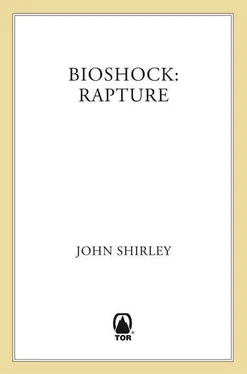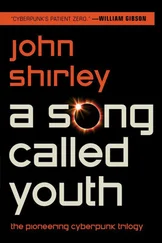And that had been just the beginning. He’d seen far worse things traveling with his father.
Ryan shook his head and looked at the pictures of Hiroshima. Madness, but no worse than the devastation of Socialism.
His dream had always been to build something that would survive anything the little madmen could throw at him.
If only Father could be there to see it rise from the shadows, magnificent, unafraid, a fortress dedicated to freedom.
Rapture.
PART ONE
The First Age of Rapture
The parasite hates three things: free markets, free will, and free men.
—Andrew Ryan
Park Avenue, New York City
1946
Almost a year later…
Bill McDonagh was riding an elevator up to the top of the Andrew Ryan Arms—but he felt like he was sinking under the sea. He was toting a box of pipe fittings in one hand, tool kit in the other. He’d been sent so hastily by the maintenance manager he didn’t even have the bloody name of his customer. But his mind was on earlier doings in another building, a small office building in lower Manhattan. He’d taken the morning off from his plumbing business to interview for an assistant engineer job. The pay would start low, but the job would take him in a more ambitious direction. They had looked at him with only the faintest interest when he’d walked into the Feeben, Leiber, and Quiffe Engineering Firm. The two interviewers were a couple of snotty wankers—one of them was Feeben Junior. They seemed bored by the time they called him in, and their faint flicker of interest evaporated completely when he started talking about his background. He had done his best to speak in American phraseology, to suppress his accent. But he knew it slipped out. They were looking for some snappy young chap out of New York University, not a cockney blighter who’d worked his way through the East London School of Engineering and Mechanical Vocation.
Bill heard them say it, through the door, after they’d dismissed him: “Another limey grease monkey…”
All right then. So he was a grease monkey. Just a mechanic and, lately, a freelance plumbing contractor. A dirty little job screwin’ pipes for the nobs. Heading up to some rich bloke’s penthouse. There was no shame in it.
But there wasn’t much money in it either, working on assignment for Chinowski’s Maintenance. It’d be a long time before he could save up enough to start a big contracting outfit of his own. He had a couple of lads hired on, from time to time, but not the big contracting and engineering company he’d always envisioned. And Mary Louise had made it clear as polished glass she was not really interested in marrying a glorified plumber.
“I had enough of fellas that think they’re the cat’s meow because they can fix the terlet,” she said. A pretty girl from the Bronx was Mary Louise Fensen and raring to go. But not terribly bright, after all. Probably drive him barmy anyway.
The moment he’d got home the phone rang, Bud Chinowski, barking about getting his ass to an address in Manhattan, on Park Avenue. Their building maintenance was AWOL—probably drunk somewhere—and the Bigshot at the penthouse needed plumbers “fast as you can drag your lazy ass over there. We’ve got three bathrooms to finish installing. Get those witless wrench-jockeys of yours over there too.”
He’d called Roy Phinn and Pablo Navarro to go on ahead of him. Then he’d changed out of the ill-fitting suit, into the gray, grease-stained coveralls. “Limey grease monkey…” he’d murmured, buttoning up.
And here he was, wishing he’d taken time for a cigarette before coming—he couldn’t smoke in a posh flat like this without permission. He stepped glumly out of the elevator, into an antechamber to the penthouse, his toolbox clanking at his side. The little wood-paneled room was scarcely bigger than the elevator. An artfully paneled mahogany door with a brass knob, embossed with an eagle, was its only feature—besides a small metal grid next to the door. He tried the knob. Locked. He shrugged, and knocked on the door. Waiting, he started to feel a little claustrophobic.
“’Ello?” he called. “Plumbin’ contractor! From Chinowski’s! ’Ello!” Don’t drop your Hs, you bastard, he told himself. “ Hel -lo!”
A crackling sound, and a low, forceful voice emanated from the grid. “That the other plumber, is it?”
“Uh…” He bent and spoke briskly into the grid. “It is, sir!”
“No need to shout into the intercom!”
The door clicked within itself—and to Bill’s amazement it didn’t swing inward but slid into the wall up to the knob. He saw there was a metal runner in the floor and, at the edge of the door, a band of steel. It was wood on the outside, steel inside. Like this man was worried someone might try to fire a bullet through it.
No one was visible on the other side of the open doorway. He saw another hallway, carpeted, with some rather fine old paintings, one of which might be by a Dutch master, if he remembered anything from his trips to the British Museum. A Tiffany lamp stood on an inlaid table, glowing like a gem.
This toff’s got plenty of the ready, Bill thought.
He walked down the hall, into a large, plush sitting room: luxurious sofas, a big unlit fireplace, more choice paintings and fine lamps. A grand piano, its wood polished almost mirrorlike, stood in a corner. On an intricately carved table was an enormous display of fresh flowers in an antique Chinese jade vase. He’d never seen flowers like them before. And the decorations on the tables…
He was staring at a lamp that appeared to be a gold sculpture of a satyr chasing an underdressed young woman when a voice spoke sharply to his right. “The other two are already at work in the back… The main bathroom’s through here.” Bill turned and saw a gent in the archway to the next room already turning away from him. The man wore a gray suit, his dark hair oiled back. Must be the butler. Bill could hear the other two lads, faintly, in the back of the place, arguing about fittings.
Bill went through the archway as the man in the suit answered a chiming gold and ivory telephone on a table in front of a big window displaying the heroic spires of Manhattan. Opposite the window was a mural, done in the sweeping modern-industrial style, of burly men building a tower that rose up out of the sea. Overseeing the workers in the mural was a slim dark-haired man with blueprints in his hand.
Bill looked for the WC, saw a hallway with a gleaming steel and white-tile bathroom at its end.
That’s my destination, Bill thought bitterly. The crapper. A fine crapper it might be, one of three. My destiny is to keep their WCs in working order.
Then he caught himself. No self-pity, now, Bill McDonagh. Play the cards you’re dealt, the way your Da taught you.
Bill started toward the door to the bathroom hall, but his attention was caught by the half-whispered urgency of the man’s voice as he growled at the telephone.
“Eisley, you will not make excuses! If you cannot deal with these people I will find someone who has the courage! I’ll find someone brave enough to scare away this pack of hungry dogs! They will not find my campfire undefended!”
The voice’s stridency caught Bill’s attention—but something else about it stirred him too. He’d heard that distinctive voice before. Maybe in a newsreel?
Bill paused at the door to the hall and had a quick look at the man pressing the phone to his ear. It was the man in the mural—the one holding the blueprint: a straight-backed man, maybe early forties, medium height, two thin, crisply straight strokes of mustache matched by the dark strokes of his eyebrows, a prominent cleft chin. He even wore a suit nearly identical to the one in the painting. And that strong, intense face—it was a face Bill knew from the newspapers. He’d seen his name over the front door of this very edifice. It never occurred to him that Andrew Ryan might actually live here. The tycoon owned a significant chunk of America’s coal, its second biggest railroad, and Ryan Oil. He’d always pictured a man like that whiling the days away playing golf on a country estate.
Читать дальше












